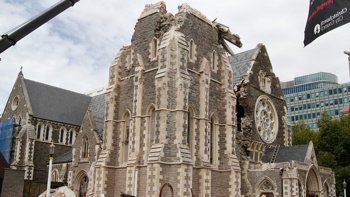UPDATED 6.27pm The caregivers of Moko Rangitoheriri have each been jailed for 17 years.
LISTEN ABOVE: Newstalk ZB report Hannah Bartlett talks to Kerre and Mark after having been at the sentencing
Tania Shailer and David Haerewa have been handed the highest ever sentence for the manslaughter of a child, after a lengthy sentencing at the High Court in Rotorua.
The pair beat the three-year-old so severely, he died from the abuse.
Judge Sarah Katz started at life imprisonment, and then gave a discount for guilty pleas and personal circumstances.
They'll be behind bars for at least nine years.
Shailer and Haerewa looked after Moko, while his mother cared for her other child in Starship Hospital.
Earlier, Moko's mother Nicola Dally-Paki sobbed giving her victim impact statement in court.
"Aren't you meant to be my friend. Someone I could trust. Instead you torture and kill my child. When you are sentenced I hope you think about your actions and accept that this is yours and David fault."
MORE:Hundreds seek justice for Moko around NZ
Defence lawyer Harry Edward had earlier told the court that Haerewa should be held less culpable than co-defendant Shailer.
He said while it's been difficult to determine which defendant inflicted specific injuries, it's understood Shailer dealt the fatal stomp that ruptured his bowel.
"Tania stated that she was struggling to cope with the behaviour of these children. Tania referred to them as traumatised child. Tania stated that she wanted to find help and someone to work with Moko to deal with his behavioural issues."
Harry Edward says while his client accepted a prison term was appropriate, he didn't think it should be a life sentence.
Shailer's lawyer had argued for a sentence of 14 to 15 years, due to mental health issues his client suffers.
Ron Mansfield referred to a psychiatric report which mentioned a suspected personality disorder, ongoing depression and "cutting issues".
He told the court Shailer had also been subjected to domestic abuse herself leading to the possibility of Post Traumatic Stress Disorder.
"Second issue was the flashback she described when Moko hit her daughter, and how she had been engulfed in feelings of failure and inadequacy, at the time she had been assaulted by her partner David."
Justice Katz said it doesn't matter who dealt the fatal blow to to the child - because the abuse was ongoing.
She called Tania Shailer and David Haerewa's abuse of Moko a joint enterprise, as she handed down the sentences.
Justice Katz said while Shailer's stomp on Moko's stomach directly contributed to his death, Haerewa admitted encouraging and abetting that act by also assaulting the three-year-old repeatedly, and by creating and encouraging a culture of violence against Moko.
There was a lot of emotion in the public gallery, following the sentence.
Reporter Hannah Bartlett was there, and said Moko's mother had already left the courtroom in tears, as the judge read out the gruesome abuse her child suffered at the hands of his killers.
"She want through the police issued summary of facts and at one point, when she described the fact that Moko had had his own faeces put in his face, their reaction of course, was outcry from the public gallery."
After the sentencing, outside the court, Moko's uncle Anthony Pakia told a small crowd still gathered there that it's been an incredibly sad time for the family.
"We just want to thank everybody, each and every one of you that was here today. Those that were doing the marches for us, for my nephew, for our family, Moko."
Police again passed on their condolences to Moko's family and have acknowledged the officers who worked on the investigation into the toddler's death.
"Any case involving a young and vulnerable victim like Moko is extremely difficult for all involved, and I would like to commend the officers involved for their diligence and professionalism," Detective Inspector Lewis Warner said.
Police could not comment on the specifics of the prosecution as the Coroner has indicated an inquest into Moko's death will be held.
New Zealand First leader Winston Peters said the downgraded manslaughter conviction reflected a trend of “political systems disguising the real nature of crime”.
“This was a murder of the very worst sort and the charges should never have been downgraded.
“Not being honest about crime in New Zealand leads to tragedy. Contrary to National’s spin, crime is not down, it’s up. All sorts of offenders are now being warned rather than charged.”
Sensible Sentencing Trust founder Garth McVicar said the sentence showed Justice Sarah Katz had “gone as far as possible under the current legislation”.
“The police originally charged [Moko’s killers] with murder ... those charges should have stuck and the sentence would’ve been life without parole.”
Justice Minister Amy Adams had called for the public to stand up for vulnerable children in the community and today, in protests around the country, they had, Mr McVicar said.
It was now time for lawmakers to step up.
“For New Zealand to get on top of this horrific level of child abuse we need to redefine the boundaries and redefine the consequences for anybody who hurts or abuses a child ... we were surprised [Justice Katz] went the whole way in sentencing. It shows her frustration.”
Family First NZ national director Bob McCoskrie said the organisation welcomed the sentences given to Moko’s killers.
But they still wanted a review of child abuse laws and changes to the legal system to avoid plea bargains.
“The message has to be clear — if you violently abuse a child in such a way that it results in their death, then it will be treated as murder. Violent child abusers should not get manslaughter when the child victim gets a life sentence.”
Communities were often told to “do more and speak up”, but politicians and the legal system must also “reflect the revulsion that New Zealand families have towards the violent murders of defenceless and vulnerable children”, he said.
“The wrong message is currently being sent to society as to how much value is placed on the life of a child. Moko’s case is just another example. This is not the first time. But it has to be the last.”
The New Zealand Bar Association has defended the process of downgrading murder charges to manslaughter, saying it has "every confidence" in the solicitor-general's considerations.
It's also hit out against misinformed pubic debate from those who don't ave all the evidence about cases at their fingertips.
"Suggestions, reported in the media, that the process is flawed or that financial implications are relevant to the decision are misconceived and wrong," said association president Clive Elliott, QC.
"Unlike the public, the solicitor-general will have carefully considered all the available and admissible evidence in determining the appropriate charge.
"The tragic cases involving the death of a baby or an infant often present evidential challenges for the prosecution. If the admissible evidence does not meet the threshold to secure a conviction on a particular charge it will be necessary to down-grade the charge to one where the threshold is satisfied."
The association "fully supports" public debate on such issues, particular to ensure the public properly understood the processes involved, Mr Elliott said.
"That debate is one which will be more appropriately engaged following the determination of the present Baby Moko case. It is only then that the full facts can be released to ensure the debate is adequately informed."
Attorney-General Christopher Finlayson said that accepting the manslaughter pleas and admitted facts meant prosecutors could push for a sentence that reflected what had happened to Moko.
“Without the guilty pleas, the full details...may not have otherwise come to light.
“Based on the evidence available for trial, there was a substantial risk that one or both of the defendants would not be convicted of the legal charge of murder or manslaughter.”
To prove murder, it would need to be proven beyond a reasonable doubt that Moko’s fatal facial injuries were inflicted with murderous intent.
“The injuries Moko suffered were not inevitably fatal. With reasonably prompt medical treatment, he could have been saved.
“If the jury was not satisfied beyond a reasonable doubt that Ms Shailer had murderous intent at the time she inflicted the fatal injuries, then neither she nor Mr Haerewa could have been convicted of murder.”
The defendants had a responsibility to get medical treatment for Moko, Mr Finlayson said. By failing to do so, they contributed to his death, in addition to causing his injuries.
“But the failure to discharge this duty could not in itself lead to a murder conviction for both defendants nor would a conviction for manslaughter based solely on this failure have adequately reflected the defendants’ role in inflicting the injuries which killed Moko.”
However, Labour MP David Parker is adamant the murder charge should have remained on the table.
"I believe it was a question to be left to the judge and jury, whether these killers knew the injuries they were inflicting when they kicked this boy across the room into the hall and stomped on him, whether they knew it was likely to cause his death."
Justice Katz said this killing is on a par with that of Delcelia Whittaker.
The two year old died alone in 1991 , emaciated and covered in burns and bruises after months of abuse.
Her mother Tania Whittaker and partner Eddie Smith had left her alone in the house to go to a party.
The pair were sentenced to 16 years for manslaughter - but served around two thirds of their sentence.
Take your Radio, Podcasts and Music with you









